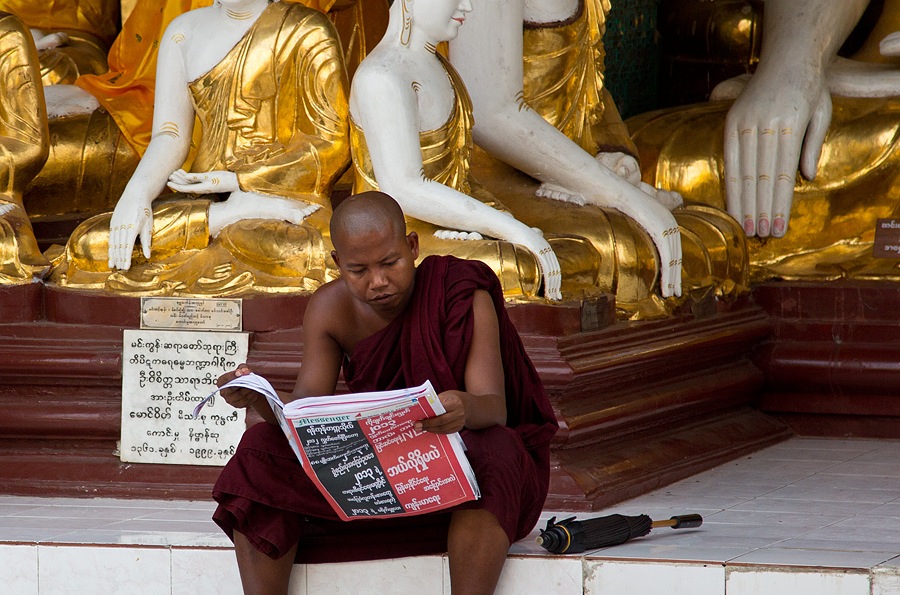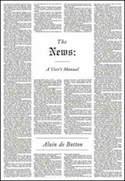
We spend so much time checking the news, but we rarely talk or think about why and how we do it. What, asks philosopher Alain de Botton, would happen if we made this ubiquitous habit feel “weirder and more hazardous”? De Botton visits Zócalo to discuss what the news is doing to our brains, souls, and views of one another. Below is an excerpt from his book The News: A User’s Manual.
 The news is committed to laying before us whatever is supposed to be most unusual and important in the world: a snowfall in the tropics; a love child for the president; a set of conjoined twins. Yet for all its determined pursuit of the anomalous, the one thing the news skillfully avoids training its eye on is itself, and the predominant position it has achieved in our lives. “Half of Humanity Daily Spellbound by the News” is a headline we are never likely to see from organizations otherwise devoted to the remarkable and the note-worthy, the corrupt and the shocking.
The news is committed to laying before us whatever is supposed to be most unusual and important in the world: a snowfall in the tropics; a love child for the president; a set of conjoined twins. Yet for all its determined pursuit of the anomalous, the one thing the news skillfully avoids training its eye on is itself, and the predominant position it has achieved in our lives. “Half of Humanity Daily Spellbound by the News” is a headline we are never likely to see from organizations otherwise devoted to the remarkable and the note-worthy, the corrupt and the shocking.
Societies become modern, the philosopher Hegel suggested, when news replaces religion as our central source of guidance and our touchstone of authority. In the developed economies, the news now occupies a position of power at least equal to that formerly enjoyed by the faiths. Dispatches track the canonical hours with uncanny precision: matins have been transubstantiated into the breakfast bulletin, vespers into the evening report. But the news doesn’t just follow a quasi-religious timetable. It also demands that we approach it with some of the same deferential expectations we would once have harbored of the faiths. Here, too, we hope to receive revelations, learn who is good and bad, fathom suffering, and understand the unfolding logic of existence. And here too, if we refuse to take part in the rituals, there could be imputations of heresy.
The news knows how to render its own mechanics almost invisible and therefore hard to question. It speaks to us in a natural unaccented voice, without reference to its own assumption-laden perspective. It fails to disclose that it does not merely report on the world, but is instead constantly at work crafting a new planet in our minds in line with its own often highly distinctive priorities.
*
From an early age, we are educated to appreciate the power of images and words. We are led to museums and solemnly informed that certain pictures by long-dead artists could transform our perspectives. We are introduced to poems and stories that might change our lives.
Yet, oddly, people seldom attempt to educate us about the words and images proffered to us every hour by the news. It is deemed more important for us to know how to make sense of the plot of Othello than how to decode the front page of the New York Post. We are more likely to hear about the significance of Matisse’s use of color than to be taken through the effects of the celebrity photo section of the Daily Mail. We aren’t encouraged to consider what might happen to our outlooks after immersion in Bild or OK ! magazine, the Frankfurter Allgemeine Zeitung or the Hokkaido Shimbun, the Tehran Times or the Sun. We are never systematically inducted into the extraordinary capacity of news outlets to influence our sense of reality and to mold the state of what we might as well—with no supernatural associations—call our souls.
For all their talk of education, modern societies neglect to examine by far the most influential means by which their populations are educated. Whatever happens in our classrooms, the more potent and ongoing kind of education takes place on the airwaves and on our screens. Cocooned in classrooms for only our first 18 years or so, we effectively spend the rest of our lives under the tutelage of news entities which wield infinitely greater influence over us than any academic institution can. Once our formal education has finished, the news is the teacher. It is the single most significant force setting the tone of public life and shaping our impressions of the community beyond our own walls. It is the prime creator of political and social reality. As revolutionaries well know, if you want to change the mentality of a country, you don’t head to the art gallery, the department of education or the homes of famous novelists; you drive the tanks straight to the nerve centre of the body politic, the news HQ.




Send A Letter To the Editors